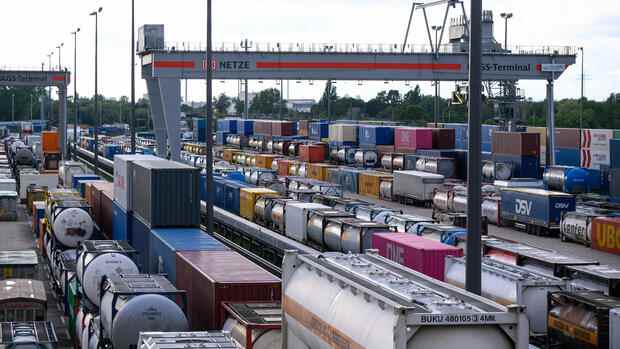Berlin The pressure on Deutsche Bahn AG is growing to part with holdings and invest the proceeds in the rail network. For example, the Network of European Railways (NEE) welcomes the sale of the logistics subsidiary DB Schenker planned by the federal government. “The proceeds should be used in full to finance the modernization of the rail infrastructure,” said association spokesman Ludolf Kerkeling. “The funds raised should flow without deduction into a transparent rail infrastructure fund based on the Swiss model.”
Kerkeling thus joined the demand of the German construction industry. “The federal government should set up a rail fund,” said managing director Tim-Oliver Müller in the Handelsblatt and asked the railways to part with their foreign investments if they do not contribute to the quality of the network in Germany.
Consumer advocates are making similar demands. “It must finally be said: No more time and no more money for extravagance,” said the mobility expert at the Federal Association of Consumers, Marion Jungbluth. The foreign expansion is “incomprehensible” for passengers. The railway should ensure an “appropriate railway service that is necessary for climate protection” and eliminate the chaos on the rail network.
Minister Wissing speaks of chaos
In view of the poor condition of the network, the pressure on the railway is increasing. To talk about the subject, the industry met with Federal Transport Minister Volker Wissing (FDP) in Berlin on Thursday for a “rail summit”.
Top jobs of the day
Find the best jobs now and
be notified by email.
Wissing expects that digitization and general renovation of the network will lead to more capacity and reliability in order to end today’s “chaos” on the network. “The railway belongs at the center of future-proof, climate-friendly mobility,” said the minister.
Today, the railway has more than 500 holdings. In addition to Schenker, this also includes the local transport subsidiary Arriva, which is now up for sale. This year Deutsche Bahn also got involved in Ghana to expand the rail network there, as well as in Canada. It’s about a transit system in Toronto.
multi-pronged
500
holdings
runs the Deutsche Bahn. One of the most important is the logistics subsidiary Schenker.
Railway boss Richard Lutz wants to hold on to foreign investments if these activities make a contribution to the “strong rail” strategy. He warns against selling Schenker. “The one-time sale of silverware” is “not a sustainable solution for the structural underfunding of infrastructure investments”.
The Schenker sale alone could bring in up to 15 billion euros. “As part of a special fund for the public interest-oriented rail infrastructure company planned for 2024, these funds can be used to make up for lost time,” said NEE spokesman Kerkeling.
“The federal rail network must finally be brought into the 21st century – for example with new timetable and operational IT, digital interlockings, passing loops with a European standard length of 740 meters and a price-stable supply of renewable energies.” However, the proceeds should not go into the federal budget seep away “uncontrolled” and left to the railways.
Debt at Bahn AG back to record level
Deutsche Bahn’s debt is now back to the level it was at the time of privatization. In the mid-1990s, the federal government had forgiven the railways so that they should prosper as a stock corporation. Equity was increased several times.
“No sustainable solution for the structural underfunding of infrastructure investments.” Bahn boss Lutz on demands for the sale of the logistics subsidiary Schenker
Minister Wissing now wants Deutsche Bahn to sell its logistics subsidiary Schenker. The supervisory board of the railway is to decide at its next meeting. The federal government also wants to transform the network operator, DB Netz AG, into a society geared towards the common good. However, this should remain part of the railway company.
At the rail summit, Deutsche Bahn presented its ideas on how it intends to comprehensively renovate two heavily used sections of the network each year from 2024 to 2030. The core of the concept is no longer to renovate individual elements on routes depending on wear and tear, but to completely renew route sections. This is to prevent construction sites from opening again and again. In the short term, the new concept will cost more money than the federal government and the railways have agreed to maintain the network.
The draft budget for 2023 still provides 8.9 billion euros for the railways, less than in previous years. The federal government wants to invest a total of 18.6 billion euros in its infrastructure, in 2021 it was 1.7 billion euros more. This is a “fatal signal”, warns Christian Funke, Managing Director of the Pro Mobility association. The devaluation of money means that less can be built for the same money.
The federal government wants to provide 500 million euros extra for the railways
At least the federal government is planning to provide 500 million euros extra for the railways as part of the relief package and one billion euros for “climate-friendly mobility”. Minister Wissing explained that this “underlines the importance of the mode of transport”.
The Federation of German Industries demands that the additional money should “above all benefit the expansion of the IT infrastructure on the rails”. Freight traffic is increasing on the heavily used routes. “Capacity bottlenecks cannot be solved in the foreseeable future by classic infrastructure expansion alone,” it said. “Digital solutions are necessary for rail transport.” They created more reliability, higher capacity and greater efficiency.
More: Fund recipients from the railways and donors from the federal government – a critical dual role for Werner Gatzer
